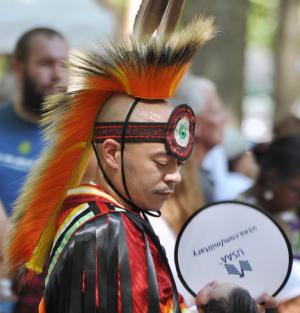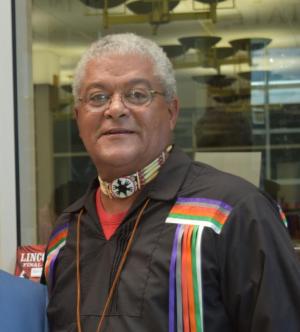Adapting to climate change isn’t new for state’s Indigenous peoples
According to Lenape Indian Chief Dennis Coker, Delaware’s Native Americans have been dealing with the impacts of environmental changes such as sea level rise for thousands of years. When the grassed plains of the outer continental shelf began to fill with sea water, Native Americans moved to higher grounds, he said.
“The difference is, now we really don’t have anywhere to go,” said Coker. “We can no longer just move, because the land doesn’t belong to us anymore, according to government officials.”
Coker made his comments during a May 12 discussion titled “Caretakers of the Environment: Climate Change and Indigenous Peoples of Delaware.” It was presented by University of Delaware’s Students for the Environment and facilitated by Melanie Ezrin, president of the student group. Coker and Nanticoke Indian Assistant Chief Brett Jackson represented the state’s Native Americans.
Coker began the hour-long discussion with “words before other words” – essentially a prayer to Mother Earth – so that all the minds of the participants were one.
Coker said one of the differences in the approach to the environment between Native Americans and the Western world is how important plants are. The Western world looks as plants as resources, while Native Americans look at those same plants as relatives.
“If we treat those resources as family, they will continue to support us into the future,” said Coker, adding it’s their job to give a voice to those relatives who have no voice.
Coker said among the biggest challenges for the state’s Native Americans is how little political clout they wield, estimating their population makes up about half of 1 percent of the state’s populations. That’s why the groups are seeking advocacy partners, he said.
“If you’re not at the table, then you’re probably on the menu,” said Coker.
Jackson said one of the biggest changes he’s seen in his lifetime is the desire of the tribe’s younger generations to hunt – or in most cases, to not hunt. He said he remembers stories from his grandfather about going rabbit hunting before and after school or going crabbing in the morning so they’d have something to eat for breakfast.
That’s how essential the environment was, said Jackson – it was providing food for breakfast.
Jackson said the overproduction of agricultural products – primarily chickens and the resources to feed them – has led to the pollution of many of the state’s waterways, especially in Sussex County. People used to be able to see the bottoms of local rivers and streams, but that’s not the case anymore, he said.
Jackson said it was important for the state’s tribes to start working with each other, as well as other local groups and the area’s politicians. The time is now for the future generations, because there’s nothing more important than the future, he said.
Coker agreed.
“We’re really up against a wall. We really do need to act, and to act quickly,” said Coker. “We only have one Mother Earth, and when she gets tired she’s going to shake us off her back like fleas on a dog.”
Both Coker and Jackson ended the discussion by saying they want to, are willing and would be happy to work with people to better serve the environment. Coker can be contacted at lenapedelaware@comcast.net. Jackson can be contacted at at info@nanticokeindians.org.
The Students for the Environment’s entire discussion can be seen on online at youtube.com/watch?v=BwkCSQN38S8.


























































